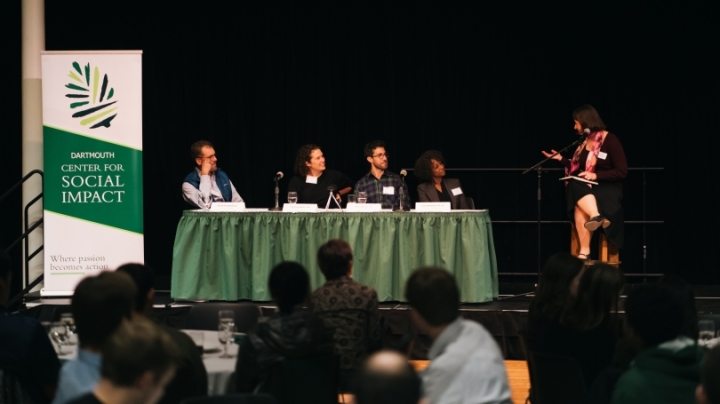Each year, the Dartmouth Center for Social Impact creates and supports a myriad of opportunities for students to deepen their connection to community and drive positive social change near campus, in their own neighborhoods, and across the world.
But how, exactly, can they keep up all that good work after they graduate?
That’s where Breaking the Mold comes in. It’s a yearly gathering for students interested in exploring careers that positively impact society. On Nov. 7 and 8, on panels and through informal networking and shared meals, alumni will speak about why they were drawn to helping others and how they are tackling some of the most pressing problems of our time.
“The conference is an integral part of our work at the center as we seek to expose students to the breadth and depth of the social impact space,” says DCSI Assistant Director Henry Do Rosario. “There are so many roles, sectors, and organizations that drive amazing change in our society, but students might never learn about them without meeting our inspiring alumni.”
On Nov. 7, the center hosts a dinner featuring keynote speakers. On Nov. 8, a breakfast discussion will be followed by three afternoon panels: Public Health and Community-Centered Health Care; Public Interest Law and Building a Just Society; and Community, Policy, and the Front Lines of Change.
This year’s alumni guests are:
- Sam Abel-Palmer ’79, executive director, Legal Services Vermont
- Jess Blanch ’05, senior program director, Enterprise Community Partners
- John Brett ’00, minister and community programs director, San Francisco Night Ministry
- Julie Davis ’91, clinical assistant professor of community and family medicine, Geisel School of Medicine
- Laura Gillespie ’86, director of development and communications, Upper Valley Haven
- Corey Hirokawa ’95, assistant director, Emory Law Center for Public Service
- Tommy Lark ’92, MED ’01, founder and CEO, Grassroots Soccer
- Dan Lucey ’77, MED ’81, clinical professor of medicine and infectious diseases, Geisel School of Medicine
- Jan Malcolm ’77, former commissioner of health, Minnesota Department of Health
- Angela McConney ’90, commissioner to the Civil Service Commission for Massachusetts
- Ann Sharfstein ’99, educator, Lebanon High School
- John Smith ’09, attorney, Vermont Legal Aid
- Matt Wilson ’83, executive director, Discovering Justice
- David Woody ’77, president and CEO, The Bridge Homeless Recovery Center
Sarah Williams ’25, from North Brunswick, N.J., who is majoring in anthropology and gender studies with a minor in studio art, became involved with DCSI between fall and winter terms of her first year through an internship at Elijah’s Promise, a soup kitchen and culinary school in her hometown.
“That winterim impact program helped me understand systems mapping and what gaps and levers there are within the community,” she says. “Who are the stakeholders and who are the people that we heavily rely on in order for this organization to keep going?”
Williams went on to become a mentor for a young girl in Hanover, and plans, after graduation, to find a job in the nonprofit sector. At the upcoming conference, she hopes to meet alumni who will lend encouragement and guidance.
“Breaking the Mold helps keep students passionate about what they’re really interested in and pushes us to keep going,” she says.
Haley Banta ’25 has already found a job after she graduates, working in New York City for the consulting firm Guidehouse on its public housing team. She says the seeds for that career choice were sown early, by DCSI.
“I worked with a nonprofit in San Francisco through the Center for Social Impact called Compass Family Services,” she says. “It’s a housing nonprofit where I learned about development and leadership in addition to early childhood education and early intervention for young children experiencing poverty. And both of these experiences have given me different understandings of how housing works at a structural and personal level, which is bringing me into my job after college.”
Banta expects Breaking the Mold to yield new insights and connections as she takes this next step.
“There’s so much about this year’s lineup that relates to my goals,” she says. “A lot of the speakers work in housing, and one of the lunch seminars is focused on public health, which is extremely important to me as a psychology major with an interest in improving access to mental health care.”
In a way, says Do Rosario, the conference is a gift that keeps on giving. While they’re on campus, he’ll interview several Breaking the Mold speakers for the center’s monthly podcast, All the Difference, spreading their wisdom to a wider audience.

